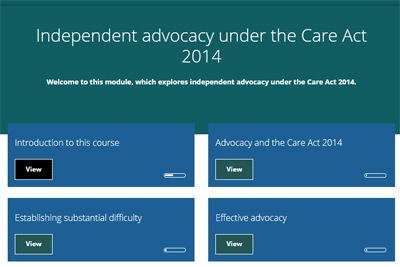Under the Care Act 2014 the role of the independent advocate is to support an individual or carer to understand information, express their needs and wishes, secure their rights, represent their interests and support them to obtain the care and support they need.
The Act requires local authorities to involve people in all decisions about their care and support. People should be active partners in the key processes of assessment, care and support planning, review and any enquiries in relation to abuse or neglect. This can mean appointing an independent advocate to support a person’s involvement if there isn’t an appropriate person, such as a friend or family member, to fulfil the role. Independent advocacy is also important during a safeguarding enquiry or Safeguarding Adult Review (SAR).

Course content
- Advocacy and the Care Act 2014
- Establishing substantial difficulty
- Effective advocacy
- Safeguarding and advocacy
- Links with other types of advocacy
Learning outcomes
- Explain what independent advocacy means under the Care Act 2014
- Identify when independent advocacy must be offered
- Understand the concepts of ‘substantial difficulty’ and ‘appropriate person’ and how they apply to supporting a person’s involvement in the process and in decision-making
- Determine the role of an independent advocate under the Act, and the potential benefits of their involvement
- Be aware of other statutory advocacy services, and to understand the differences between independent advocacy under the Care Act 2014 and other types of statutory advocacy
- Recognise what can be expected from independent advocacy services that are commissioned locally
